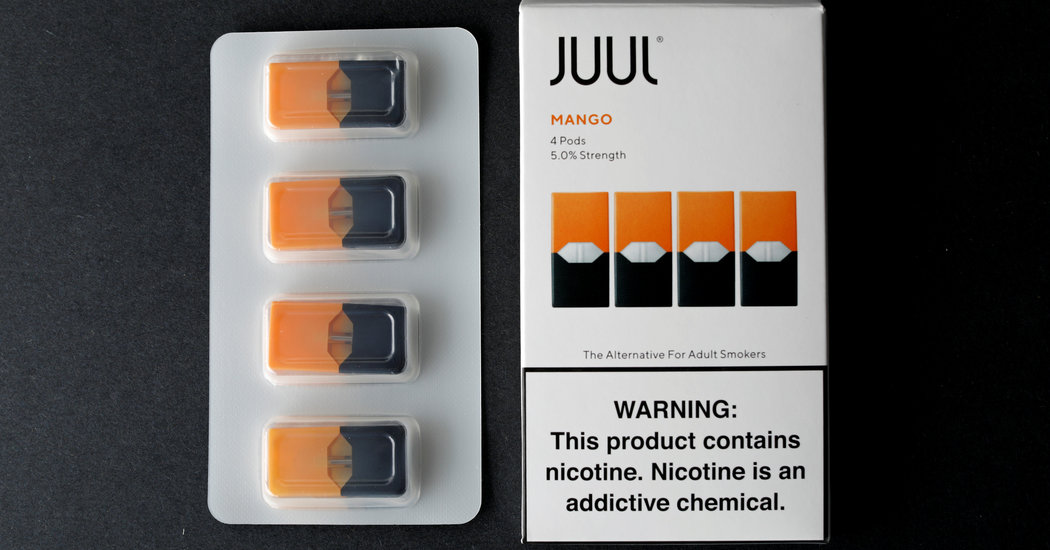
Juul Labs announced on Thursday that it would temporarily halt online sales of flavored e-cigarettes like mango, products the company had already stopped distributing to retail stores as public outrage mounted over the soaring rate of teenage vaping.
Facing multiple federal and state investigations into its marketing practices, Juul said it decided to discontinue the sales for now until the Food and Drug Administration had reviewed the device and flavor cartridges. But the suspension, which also includes crème, fruit and cucumber, does not extend to menthol or mint.
Last month, the F.D.A. issued warning letters to the company, saying it had illegally marketed its products as a safer alternative than traditional cigarettes. The agency also criticized its “make the switch” marketing campaign, contending that its advertising suggested health claims that the company had not proved. The agency has continued to investigate Juul’s marketing strategies, as parents and public health experts argued that its array of flavors were directly aimed at youth and could addict a new generation to nicotine.
And while the recent wave of mysterious lung illnesses that has stricken 1,479 people is mostly tied to vaping THC-oil products that may be tainted or adulterated, the health effects of vaping nicotine liquids in e-cigarettes have also come under intense examination by researchers and public health officials. Thirty-three deaths have been reported.
The company’s decision appeared to be an effort to get ahead of the Trump administration’s anticipated ban on flavored e-cigarettes, which is still expected to include mint and menthol despite lobbying by some trade groups opposed to barring menthol.
Top health officials had said in mid-September they would issue a draft ban within weeks, although several vaping groups have vowed to fight the ban — especially the restriction on menthol. In the meantime, major retailers like Walmart and Walgreens have decided to stop selling e-cigarettes and a number of states have tried to impose bans mainly on flavored products. Vaping businesses are waging court battles against the restrictions in some states.
K.C. Crosthwaite, the company’s new chief executive, acknowledged that the decision to further curb sales of certain flavors was occurring against a backdrop of public mistrust of the industry.
It is the latest action taken by Mr. Crosthwaite, who became chief executive of Juul when Kevin Burns stepped down late last month. Mr. Crosthwaite was a top official at Altria, the cigarette giant that bought a 35 percent share in Juul for $12.8 billion last December.
Since taking the post, he has also suspended Juul’s advertising, and withdrawn the company’s support for a San Francisco ballot measure that sought to reverse the city’s ban on e-cigarette sales. It remains on the ballot, however.
“We must reset the vapor category by earning the trust of society and working cooperatively with regulators, policymakers and stakeholders to combat underage use while providing an alternative to adult smokers,” Mr. Crosthwaite said in making the announcement on Thursday.
E-cigarette sales have declined somewhat in the last several weeks, as the twin health crises of teenage vaping and the illnesses unfolded. Weekly sales of Juul’s flavor pods have dropped from 14.3 million in early June to 11 million for the week ending Oct. 5.
Company officials have previously indicated that online sales account for less than 10 percent of its overall revenue.
[Like the Science Times page on Facebook. | Sign up for the Science Times newsletter.]
The mint and menthol varieties are among Juul’s biggest sellers, and the company said Thursday that it would continue to sell them, and its two tobacco flavors, in retail stores and online. Juul has said it would not itself lobby against the proposed flavor ban. But the major United States tobacco companies — like Juul’s investor Altria and Reynolds American, which makes the Vuse e-cigarette — have long argued that these flavors are important for smokers who want to switch to e-cigarettes.
A new poll conducted by the Kaiser Family Foundation showed that roughly half of Americans favored a ban on flavored or all e-cigarettes, although people ages 18 to 29 opposed both.
Michael Bloomberg, who has been funding a $160 million campaign to lower youth vaping, was unimpressed by Juul’s announcement.
“Juul knows that nearly two-thirds of high school students who use e-cigarettes now use mint or menthol flavors, which is driving Juul’s bottom line,” said Mr. Bloomberg, the former mayor of New York City. “This is precisely why the F.D.A. must honor its commitment to remove all flavored e-cigarettes from the shelves as quickly as possible.”
Mr. Crosthwaite said the company was weighing whether mint or menthol should be removed from the market.
Juul is the target of numerous lawsuits, filed by municipalities and now school districts; parents of some teenagers are also suing the company, claiming addiction and harm. Earlier this month, the Montgomery County Council, of Maryland, filed a lawsuit against Juul Labs and Altria Group, claiming that the companies had violated Maryland and federal law by aggressively marketing addictive e-cigarettes to minors.
On Thursday, the government of King County, Wash., which includes Seattle, also filed suit against Juul, claiming that the company had created and maintained the youth vaping epidemic.
“It is clear that Juul, like Big Tobacco before it, targeted youth to hook a whole new generation on candy-coated nicotine,” Dow Constantine, the county executive, said. “Juul was well aware that their products would appeal to youth — driving what is now an ever increasing epidemic of nicotine addiction and severe lung illness. Now the taxpayers of King County are left to cope with a public health crisis that has lined the pockets of Juul and their shareholders, and we will not stand for it.”

